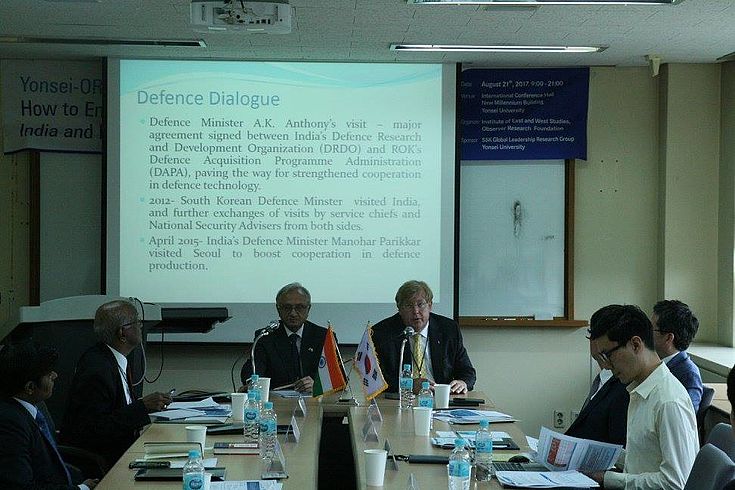Yonsei-ORF Dialogue on “How to Enhance Strategic Partnership between India and Korea”
Dr. Bernhard Seliger of Hanns Seidel Foundation Korea (HSF) was invited to comment on the political agenda for the strategic partnership in the first session of the conference. The conference was opened with congratulatory remarks by Prof. Yong-suhk Pak, Director of the Institute of East and West Studies as well as Prof. K.V. Kesavan, distinguished fellow at the ORF. They were followed by a keynote speech on the strategic partnership by Ramkumar Chakravarthy, Secretary at the Embassy of India in Seoul.
The first session saw two papers by Prof. Woo-yeal Paik of Yonsei University, on “Deeper Interactions between South Korea and India? Moon’s Northeast Asia Plus Community and Modi’s Act East Policy” and by Prof. Kesavan on “India-South Korea Strategic Partnership in the Regional Context”. Prof. Paik pointed out that one of the most important policy innovations of the Moon administration, which was part of the one hundred important policies at the Moon agenda, is the “South policy” looking at ASEAN and India. Prof. Kesavan spoke of the interdependence of East Asian countries and India and the chances of strengthening each other by cooperation, e.g. in the face of strategic challenges.
Dr. Seliger of HSF pointed out that there was a great coincidence of interest, but this did not necessarily meant a real coincidence of values. The specific nuclear status of India (being a nuclear power, a non-member of the Non-Proliferation Treaty and Comprehensive Nuclear Test Ban Treaty, but still enjoying free commercial nuclear use), which sometimes is invoked by North Korea as an example of non-equal treatment of countries at the global level, is a striking example for that. Dr. Seliger also proposed more people-to-people exchanges, e.g. through a volunteer program in the environmental or educational sector.
The second session looked at the economic agenda for the strategic partnership of both countries. Jayshree Sengupta, Senior Fellow at the ORF, discussed “Prospects and Challenges in India-Korea Trade and Investment”. Prof. Doo-won Lee of Yonsei University looked at the “Potential of Korea-India Economic Cooperation”, followed by a discussion of Prof. Soon-kyoo Choe of Yonsei University. Finally, the third session looked into a business agenda for both sides. Tanoubi Ngangom, Associate Fellow at ORF, discussed “Towards a Mutually Beneficial Partnership: The Case of RCEP”. Prof. Young-ryeol Park and Yong-suhk Pak undertook an “Analysis of India as our Next Business Partner”. Skand Tayal, former Indian Ambassador to the Republic of Korea, spoke on “Korean Enterprises: Partners for Make-in-India”, followed by comments from Prof. Joo-young Kwak.
While both the Indian and Korean participants stressed that their cooperation should not be seen as directed against another country, still the specter of a more assertive China did look large over the meeting, with the recent tensions on the Bhutan-China-India border and on the Korean Peninsula.

